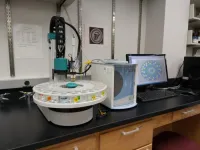(Press-News.org) DALLAS, April 17, 2024 — Language barriers, longstanding structural racism barriers, underrepresentation within the ranks of health care professionals and higher than average rates of poor health risk factors are among the alarming trends that continue to impede quality health care outcomes for Hispanic Latino people living in the United States. The American Heart Association, celebrating 100 years of lifesaving service as the world’s leading nonprofit organization focused on heart and brain health for all, is making strides in tackling these health challenges through a series of key initiatives aimed at reducing health disparities.
“Research shows Hispanic Latino people have disproportionately higher rates of certain risk factors for cardiovascular disease, such as high blood pressure, high cholesterol and diabetes. Yet, studies have suggested that of all racial and ethnic groups in the United States, Hispanic Latino people are least likely to seek medical care for an illness,” said Carlos Rodriguez, M.D., M.P.H., FAHA, American Heart Association volunteer and the current chair and a founding member of the Association’s National Hispanic Latino Cardiovascular Collaborative (NHLCC). “This may stem from the severe shortage of Hispanic Latino health care professionals across the U.S. If you are sick and need health care, you want to talk to someone you trust, who can communicate easily with you and who understands your culture. That is just not an experience many Hispanic Latino people have available to them.”
Rodriquez said this lack of support often necessitates children step in as interpreters for their families during medical appointments. Even if a professional medical interpreter is provided, parents often pull their children out of school to go to appointments to ensure there is no misunderstanding or cultural misinterpretation regarding health concerns and medical instructions.
"Watching my parents struggle as they navigated the health care system is what made me realize there was a need for Spanish-speaking health care workers – especially for doctors," said Melissa Rodriguez Mendoza, a member of the 2022–2023 inaugural class of American Heart Association’s National Hispanic Latino Cardiovascular Collaborative (NHLCC) Scholars Program and currently a third-year medical student at Universidad Autónoma de Guadalajarain Jalisco, Mexico. "This early exposure is what inspired me to become the doctor my parents needed back then."
"Breaking down language barriers in health care is not just about communication; it's about breaking down walls that hinder access to vital care and ensuring every voice is heard, understood and empowered," said Alejandro de la Cova, a member of the current 2023-2024 NHLCC Scholars Program class and third-year medical student at The Ohio State University College of Medicine who is heavily involved in working with the Hispanic Latino community in Columbus, Ohio.
Rodriguez said better communication between Hispanic Latino patients and their providers could improve their health care and health outcomes while increasing trust in the health care system and can mitigate the language barriers for patients.
“I believe in the power of representation within health care. By fostering diversity and inclusion, we not only enhance patient care but also inspire the next generation of health care leaders to break barriers and drive innovation, ensuring a healthier, more equitable future for all," he said.
The Association’s National Hispanic Latino Cardiovascular Scholars Program provides mentorship and professional development opportunities, leveraging scientific thought leadership to cultivate the next generation of Hispanic Latino researchers and health care leaders to actively address longstanding systemic inequities in health care. Additionally, the Association’s Hispanic Serving Institutions (HSIs) Scholars Program supports undergraduate students enrolled in biomedical and health sciences at HSIs to connect with committed and impactful mentors to learn about health disparities in Hispanic Latino communities, how cultural sensitivity can provide safe and reassuring clinical spaces and how inclusivity is essential in science.
Learn more about how the American Heart Association is working to improve health and health care for all people at heart.org.
Additional resources:
Spanish news release
Follow AHA/ASA news on X (formerly known as Twitter) @HeartNews
###
END
Continuing efforts are addressing health disparities among Hispanic Latino people in U.S.
The American Heart Association recognizes Minority Health Month with continued commitment to reducing disparities and improving the health of all people
2024-04-17
ELSE PRESS RELEASES FROM THIS DATE:
CHEST and APCCMPD announce recipient of collaborative fellow scholarship
2024-04-17
Glenview, Illinois – Esha Kapania, MD, will be the mentee for the inaugural year of the 2024 APCCMPD and CHEST Medical Educator Scholar Diversity Fellowship.
Designed to pair a fellow-in-training with an established medical educator, the unique scholarship was launched in August by the American College of Chest Physicians (CHEST) and the Association of Pulmonary and Critical Care Medicine Program Directors (APCCMPD) to improve diversity in pulmonary and critical care medical education.
The program focuses ...
E-tongue can detect white wine spoilage before humans can
2024-04-17
PULLMAN, Wash. – While the electronic tongue bears little physical resemblance to its namesake, the strand-like sensory probes of the “e-tongue” still outperformed human senses when detecting contaminated wine in a recent study.
In an experiment at Washington State University, the e-tongue identified signs of microorganisms in white wine within a week after contamination—four weeks before a human panel noticed the change in aroma. This was also before those microbes could be grown from the wine in a petri-dish. Winemakers traditionally rely on these two methods, sniffing the wine and petri-dish testing, to ...
Adults with congenital heart disease faced higher risk of abnormal heart rhythms
2024-04-17
Research Highlights:
Almost 1 in 5 adults with congenital heart disease living in Israel had or developed an abnormal heart rhythm over five years.
Adults with congenital heart disease who developed an irregular heart rhythm in the heart’s upper chambers faced a 65% increased risk of premature death.
The adults who developed an irregular heart rhythm in the heart’s lower chambers had double the risk of premature death.
Embargoed until 4 a.m. CT/5 a.m. ET Wednesday, April 17, 2024
DALLAS, April 17, 2024 — Almost 1 in 5 adults with congenital heart disease living in Israel had or developed an abnormal ...
A better view with new mid-infrared nanoscopy
2024-04-17
A team at the University of Tokyo have constructed an improved mid-infrared microscope, enabling them to see the structures inside living bacteria at the nanometer scale. Mid-infrared microscopy is typically limited by its low resolution, especially when compared to other microscopy techniques. This latest development produced images at 120 nanometers, which the researchers say is a thirtyfold improvement on the resolution of typical mid-infrared microscopes. Being able to view samples more clearly at this smaller scale can aid multiple fields of research, including into infectious diseases, and opens the way for developing ...
New study uncovers why boys born to mothers with HIV are at greater risk of health problems and death in infancy
2024-04-17
Researchers have found that children of women with HIV infection have an increased risk of immune abnormalities following exposure to maternal HIV viraemia, immune dysfunction, and co-infections during pregnancy.
The study, led by Dr Ceri Evans while at Queen Mary University of London, compared clinical outcomes between infants who were HIV-exposed and HIV-unexposed in the Sanitation Hygiene Infant Nutrition Efficacy (SHINE) trial in rural Zimbabwe. Despite high coverage of maternal antiretroviral therapy (ART) and uptake of exclusive breastfeeding, mortality in infants exposed to HIV was 41% higher than in infants not exposed to HIV. Infants who survived and remained HIV-free ...
Interspecies competition led to even more forms of ancient human – defying evolutionary trends in vertebrates
2024-04-17
Competition between species played a major role in the rise and fall of hominins – and produced a “bizarre” evolutionary pattern for the Homo lineage – according to a new University of Cambridge study that revises the start and end dates for many of our early ancestors.
Conventionally, climate is held responsible for the emergence and extinction of hominin species. In most vertebrates, however, interspecies competition is known to play an important role.
Now, research shows for the first time that competition was fundamental to “speciation” – the rate at which new species emerge ...
First new analysis in three decades identifies which treatments for the long-term effects of malnutrition could help reduce mortality and poor health outcomes for children
2024-04-17
A comparison of treatments for malnutrition enteropathy, caused by severe acute malnutrition (SAM), has found evidence supporting the use of treatments to enhance the healing of mucosal membranes and reduce inflammation in the gut to improve the outcomes of children affected by long-team health consequences of a period of malnutrition.
The Therapeutic Approaches to Malnutrition Enteropathy (TAME), led by researchers from Queen Mary University of London, evaluated four interventions for malnutrition enteropathy in a multi-centre phase ...
AI speeds up drug design for Parkinson’s by ten-fold
2024-04-17
Researchers have used artificial intelligence techniques to massively accelerate the search for Parkinson’s disease treatments.
The researchers, from the University of Cambridge, designed and used an AI-based strategy to identify compounds that block the clumping, or aggregation, of alpha-synuclein, the protein that characterises Parkinson’s.
The team used machine learning techniques to quickly screen a chemical library containing millions of entries, and identified five highly potent compounds for further investigation.
Parkinson’s affects more than six million people worldwide, with that number projected to triple by 2040. ...
Older adults with diabetes experienced functional decline during the COVID-19 pandemic
2024-04-17
Toronto, ON —Researchers found that approximately 1 in 5 older Canadian adults with diabetes and no pre-pandemic functional limitations developed functional limitations for the first time during the COVID-19 pandemic. Functional limitations refer to difficulties with basic mobility-related tasks, such as walking two to three blocks, standing up from a chair, or climbing stairs. In comparison, only one in eight of their peers without diabetes developed functional limitations during the ...
How soil microbes survive in harsh desert environments
2024-04-17
Prolonged droughts followed by sudden bursts of rainfall – how do desert soil bacteria manage to survive such harsh conditions? This long-debated question has now been answered by an ERC project led by microbiologist Dagmar Woebken from the Centre for Microbiology and Environmental Systems Science (CeMESS) at the University of Vienna. The study reveals that desert soil bacteria are highly adapted to survive the rapid environmental changes experienced with each rainfall event. These findings were recently published in the prestigious ...
LAST 30 PRESS RELEASES:
ASU researchers to lead AAAS panel on water insecurity in the United States
ASU professor Anne Stone to present at AAAS Conference in Phoenix on ancient origins of modern disease
Proposals for exploring viruses and skin as the next experimental quantum frontiers share US$30,000 science award
ASU researchers showcase scalable tech solutions for older adults living alone with cognitive decline at AAAS 2026
Scientists identify smooth regional trends in fruit fly survival strategies
Antipathy toward snakes? Your parents likely talked you into that at an early age
Sylvester Cancer Tip Sheet for Feb. 2026
Online exposure to medical misinformation concentrated among older adults
Telehealth improves access to genetic services for adult survivors of childhood cancers
Outdated mortality benchmarks risk missing early signs of famine and delay recognizing mass starvation
Newly discovered bacterium converts carbon dioxide into chemicals using electricity
Flipping and reversing mini-proteins could improve disease treatment
Scientists reveal major hidden source of atmospheric nitrogen pollution in fragile lake basin
Biochar emerges as a powerful tool for soil carbon neutrality and climate mitigation
Tiny cell messengers show big promise for safer protein and gene delivery
AMS releases statement regarding the decision to rescind EPA’s 2009 Endangerment Finding
Parents’ alcohol and drug use influences their children’s consumption, research shows
Modular assembly of chiral nitrogen-bridged rings achieved by palladium-catalyzed diastereoselective and enantioselective cascade cyclization reactions
Promoting civic engagement
AMS Science Preview: Hurricane slowdown, school snow days
Deforestation in the Amazon raises the surface temperature by 3 °C during the dry season
Model more accurately maps the impact of frost on corn crops
How did humans develop sharp vision? Lab-grown retinas show likely answer
Sour grapes? Taste, experience of sour foods depends on individual consumer
At AAAS, professor Krystal Tsosie argues the future of science must be Indigenous-led
From the lab to the living room: Decoding Parkinson’s patients movements in the real world
Research advances in porous materials, as highlighted in the 2025 Nobel Prize in Chemistry
Sally C. Morton, executive vice president of ASU Knowledge Enterprise, presents a bold and practical framework for moving research from discovery to real-world impact
Biochemical parameters in patients with diabetic nephropathy versus individuals with diabetes alone, non-diabetic nephropathy, and healthy controls
Muscular strength and mortality in women ages 63 to 99
[Press-News.org] Continuing efforts are addressing health disparities among Hispanic Latino people in U.S.The American Heart Association recognizes Minority Health Month with continued commitment to reducing disparities and improving the health of all people



